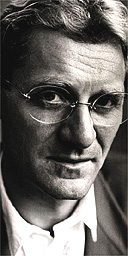
How awful it must be to wake up in the morning and remember that you are the poet laureate. Imagine how Andrew Motion - a biographer of undisputed merit and a man of undoubted sensitivity - feels when his alarm clock rings. If, like the rest of us, his mind is immediately filled with apprehensions about the traumas that the day will bring, there can be no doubt about what makes him want to sink back into a deep sleep. Last week we learned that he had written a poem to celebrate the Queen's 80th birthday. It included the lines: "The waves unfurl and change the shape of coasts, / The shrinking woods fall backwards through their leaves, / The night-horizons twist in chains of light: / The golden rule, your constancy, survives." How many of us would want to have that on our conscience?
As my mother would have said (in one of her rare benign moods), he is more to be pitied than blamed. Having taken the royal shilling - butt of sack, haunch of venison, or whatever he is paid for services to the court - he has to mark regal occasions with suitable panegyrics. The obligation is neither legal nor contractual. But the moral pressure is clearly irresistible. What else could make a sane man announce, in early 2006, that he proposes - in cooperation with the master of the Queen's music - to produce a cantata to mark the Prince of Wales's 60th birthday in 2008.
Finding inspiration to order must be difficult in any circumstances. Anticipating the arrival of the muse two years hence is surely impossible. WH Auden said that amateur poets talk of rhyme and metre while professionals discuss royalties. But although Auden wrote for money, he only wrote about subjects that moved him. That included his three clearly commercial Fragments for Films - Coal Face, Night Mail and Negroes. I have more respect for Andrew Motion than to believe he could possibly be moved by the thought of Prince Charles reaching civil-service retirement age.
Even William Shakespeare's genius failed him when he was required to stitch together a bespoke play from a story that somebody else had chosen. He could send the Globe a regular stream of incomparable comedies and dramas when he was allowed to choose his own plots from Plutarch and Plautus. When Queen Elizabeth I asked or (more or less the same thing) commanded him to write about "Sir John In Love", he could do no better than The Merry Wives of Windsor - an enduring embarrassment to all of us who think of him as England's greatest glory.
It is easy to understand why Motion agreed to become laureate. The job was invented for Ben Jonson. Dryden, Wordsworth, Tennyson, Bridges and Masefield all wore the laurel crown. But even those great men were not at their best when writing in their official capacity. Tennyson was persuaded to respond to (largely unjustified) allegations that Gladstone was neglecting the navy. His poem, addressed to the first lord of the Admiralty, ended: "You who have the ordering of her fleet, / If you have only compass'd her disgrace. / When all men starve, the wild mob's million feet / Will kick you from your place / But that too late."
It has to be said in defence of Alfred Austin - the most derided of all poets laureate - that at least he wrote what he felt in his heart. Editing a political magazine that supported Lord Salisbury's Tory government was not the ideal qualification for the appointment. But it left no doubt that he genuinely applauded the Jameson Raid. "But there's many a man lives famous / For daring a wrong like this!" And he provoked the Daily Telegraph into making one of its rare jokes. "Mr Alfred Austin has a clearly defined talent, the limits of which are by this time clearly recognised."
Andrew Motion's talents are boundless. Yet he wastes them in writing an ode to commemorate the wedding of the Earl and Countess of Wessex. Does he really perform such tasks with a straight face, or does he laugh with and at himself as he pretends that the nation joins him in rejoicing? He must know that what he does as laureate is intrinsically ridiculous. After all, he wrote a biography of Philip Larkin, who remained unwilling to accept the conventional plaudits of society. Poets are - or should be - outsiders. Like Hamlet after his father's death, they ought to feel uncomfortable at court.

